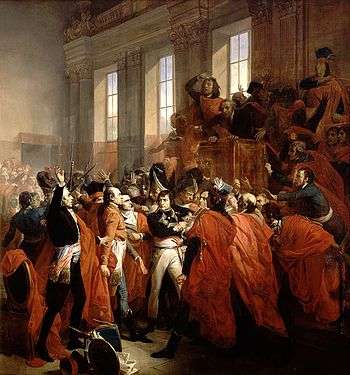Council of Five Hundred
| Council of Five Hundred Conseil des Cinq-Cents | |
|---|---|
| French First Republic | |
|
General Bonaparte surrounded by members of the Council of Five Hundred during the 18 Brumaire coup d'état. | |
| Type | |
| Type | |
| History | |
| Established | 2 November 1795 |
| Disbanded | 10 November 1799 |
| Preceded by | National Convention (unicameral) |
| Succeeded by | Corps législatif |
| Seats | 500 |
| Meeting place | |
| Salle du Manège, rue de Rivoli, Paris | |
The Council of Five Hundred (Conseil des Cinq-Cents), or simply the Five Hundred was the lower house of the legislature of France during the period commonly known (from the name of the executive branch during this time) as the Directory (Directoire), from 26 October 1795 until 9 November 1799, roughly the second half of the period generally referred to as the French Revolution.
Besides functioning as a legislative body, the Council of Five Hundred proposed the list out of which the Ancients chose five Directors, who jointly held executive power.
The Council of Five Hundred was established under the Constitution of Year III which was adopted by a referendum on 24 September 1795,[1] and constituted after the first elections which were held from 12-21 October 1795. Voting rights were restricted to citizens owning property bringing in income equal to 150 days of work.[2] Each member elected had to be at least 30 years old, meet residency qualifications and pay taxes. To prevent them coming under the pressure of the sans-culottes and the Paris mob, the constitution allowed the Council of the Five Hundred to meet in closed session.[3] A third of them would be replaced annually.[4]
In the elections of April 1797, there were a number of voting irregularities a very low turnout, resulting in a strong showing for Royalist tendencies. A number of the newly-elected deputies formed the Clichy Union in the Council. [5]
The election of April 1798 were heavily manipulated. The Council of the Five Hundred passed a law on 8 May barring 106 recently-elected deputies from taking their seats, all of whom were of a left-wing persuasion. Elections in 48 departments were annulled.[6] Nevertheless left-wing opinion grew in strength in the Council in 1799, and on 18 June 1799, the Council of Five Hundred and the Council of Ancients forced the resignations of the most anti-Jacobin Directors, Merlin de Douai, La Révellière-Lépeaux and Treilhard.[7]
In October 1799 Napoleon's brother Lucien Bonaparte was appointed President of the Council of Five Hundred.[8] Soon afterwards, in the coup of 18 Brumaire, Napoleon led a group of grenadiers who drove the Council from its chambers and installed him as leader of France as its First Consul. This ended the Council of Five Hundred, the Council of Ancients and the Directory.[9]
References
- ↑ Chronicle of the French Revolutions, Longman 1989 p.495
- ↑ Chronicle of the French Revolutions, Longman 1989 p.495
- ↑ Chronicle of the French Revolutions, Longman 1989 p.505
- ↑ Neely, Sylvia. A concise history of the French Revolution. Rowman and Littlefield. p. 226.
- ↑ Chronicle of the French Revolutions, Longman 1989 p.561
- ↑ Chronicle of the French Revolution, Longman Group 1989 p.601
- ↑ Chronicle of the French Revolution, Longman Group 1989 p.637
- ↑ Chronicle of the French Revolution, Longman Group 1989 p.645
- ↑ Chronicle of the French Revolution, Longman Group 1989 p.650
